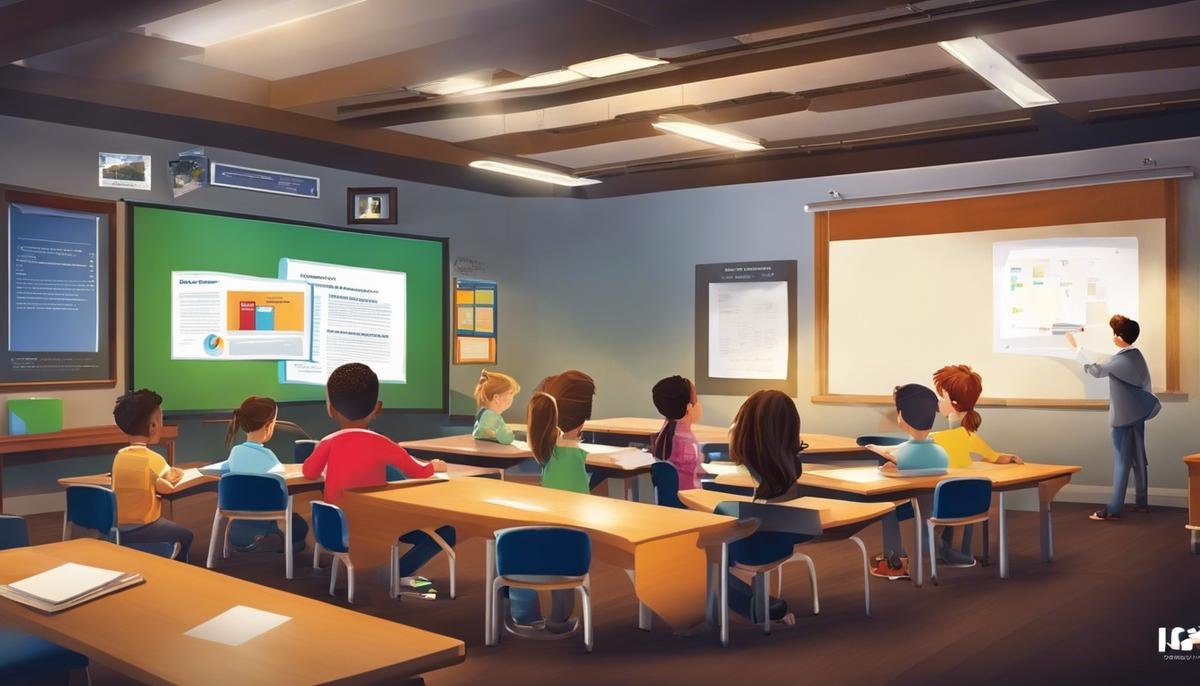The landscape of education is being reshaped by a groundbreaking technological phenomenon: ChatGPT. As a cutting-edge instantiation of artificial intelligence, ChatGPT, or the Generative Pretrained Transformer, promises to revolutionize how we engage with the learning process. Through an intricate web of neural networks and vast data analytics, ChatGPT stands at the educational frontier, offering a bridge between the vast repository of human knowledge and the unique needs of each learner. This exploration starts at the heart of ChatGPT, delving into its architecture to understand how it can potentially transform pedagogical paradigms, paving the way for unprecedented levels of educational personalization and support.
Understanding ChatGPT and Its Capacities
ChatGPT: A Pedagogical Powerhouse in Modern Education
The advent of artificial intelligence (AI) in our daily lives is becoming increasingly evident, not least in the domain of education where ChatGPT stands out as a particularly advanced and practical tool. To understand its implications, one must be familiar with both its foundational technology and its diverse applications within educational settings.
ChatGPT, short for Chat-based Generative Pretrained Transformer, is an exemplar of conversational AI developed by OpenAI. It is based on a model known as GPT (Generative Pretrained Transformer), which is trained on a vast corpus of text data, allowing it to generate human-like responses to textual input. ChatGPT is designed to understand and generate text in a conversational manner, simulating the nuances of human dialogue.
Within educational environments, ChatGPT’s capabilities are multifaceted and potent. It is instrumental in facilitating personalized learning experiences. The harmonization of ChatGPT with educational platforms enables the AI to provide immediate and customized feedback to students’ queries, irrespective of the time of day, ensuring that the learning process is continuous and responsive to each learner’s pace and style.
Moreover, ChatGPT can function as a virtual tutor, patiently clarifying concepts and providing explanations with seemingly endless patience. This aspect is exceedingly beneficial for subjects where students may require repeated clarification, such as mathematics or language learning. The AI’s ability to adapt explanations to the user’s prior responses promotes a deepened understanding and retention of knowledge.
Supplementing teacher efforts, ChatGPT can be leveraged to generate educational content, such as quizzes or essay prompts, considerably reducing preparation time and allowing educators to focus on more complex pedagogical strategies. This capability extends to the real-time curation of supplementary material tailored to the curriculum’s needs or the creation of interactive narratives that engage students in the subject matter.
Additionally, ChatGPT’s fluency in multiple languages can act as a bridge for non-native English speakers, providing them with the support needed to participate more fully in English-centric educational systems. It also offers a platform to practice language skills in a low-stress, non-judgmental environment.
Importantly, ChatGPT’s use in education extends to the analytical realm, where it can assist in the evaluation of students’ written work. While it cannot replace the intricate feedback of a human instructor, its ability to highlight grammar and syntax issues is a valuable first pass that can streamline the grading process.
Critically, one must address the potential limitations and pitfalls associated with the adoption of ChatGPT in educational contexts. There is the possibility of fostering an over-reliance on machine-generated responses which might impede the development of critical thinking and problem-solving skills among learners. Therefore, it is incumbent upon educators to strike a balance between the utilization of ChatGPT as a tool and the necessity for independent thought and inquiry among students.
In conclusion, ChatGPT serves as a potent adjunct to contemporary educational experiences. Its deployment should be orchestrated thoughtfully, with a clear-eyed view of its capabilities and potential detriments. As a harbinger of AI’s role in education, ChatGPT has set the stage for a transformative shift in the ways knowledge is imparted and absorbed. With careful integration, its promise of a more personalized, efficient, and inclusive educational landscape is well within our grasp.

ChatGPT’s Role in Personalized Learning
The Role of ChatGPT in Enhancing Individual Learning Journeys
In the domain of education, the advent of ChatGPT has signaled a transformative epoch. The proliferation of this artificial intelligence presents a myriad of possibilities specifically tailored to suit the dynamic profiles of learners. The meticulous architecture of ChatGPT allows it to refine the learning experience on an individual level, thus contributing to a more tailored approach that education specialists continually aspire to achieve.
At the intersection of technology and pedagogy, the personalization of learning emerges as an indispensable component. ChatGPT, through its intricate design, facilitates an environment where learners can traverse their educational journeys with a semblance of autonomy and personal engagement. The leverage of ChatGPT to sculpt learning paths that align with a learner’s pace, style, and level of comprehension is an acknowledgment of the diversity in the learning community.
One salient feature that exemplifies the personalization afforded by ChatGPT is its adaptability. The system intuitively adjusts to the learner’s progress, offering challenges commensurate with the individual’s competencies. This adaptable nature fosters a growth mindset, where learners are subtly nudged towards intellectual expansion without the overwhelming pressure that sometimes accompanies traditional learning frameworks.
Moreover, ChatGPT serves as a repository of endless resources. Learners have the luxury of querying an array of topics, thereby receiving a spectrum of informational content. This aligns seamlessly with the principle of differentiated instruction, where materials are tailored to meet diverse learning needs. It is particularly beneficial for learners with unique interests, as the AI can delve into niche topics that may not be readily available in conventional curricula.
As learners progress through their studies, the need for assistance in time management and organizational skills becomes vital. Herein lies another contribution of ChatGPT; it offers organizational tools that learners can utilize to schedule their study sessions, set reminders for assignments, or even create study planners. These capabilities can inculcate a sense of responsibility and foster better study habits.
In the quest for mastery, repetition is often key. ChatGPT’s ability to engage learners in repetitive learning, albeit in various forms, ensures that the material is encoded into long-term memory. By presenting the same content through different scenarios or problems, learners can grasp the underlying concepts with greater clarity.
Moreover, while teachers remain central to the educational process, the complementarity of ChatGPT in collaborative learning environments cannot be overstated. It allows groups of learners to interact with the system, thus promoting cooperative learning. Students can collectively pose questions, generate discussions, and solicit ChatGPT’s input, which can serve to stimulate further group dynamics and mutual understanding of the subject matter.
Furthermore, in addressing the individual emotional and motivational needs of learners, ChatGPT can be programmed to offer words of encouragement and personalize praise based on the achievements of the user. Understanding the psychology of learning, this tailored emotional support can positively influence a learner’s self-efficacy and perseverance.
In synthesis, the contributions of ChatGPT to the personalization of learning are manifold and significant. It provides a convergence of intelligent interactivity, resourceful content generation, and emotional intelligence, all harmonized to foster a learning environment that recognizes and nurtures the unique intellectual journey of each learner. With the ongoing development of such technologies, the future of personalized learning seems not only promising but also an exemplar of the innovative fusion between human cognition and artificial intelligence.

Assessing the Impact of ChatGPT on Student Outcomes
The Impact of ChatGPT on Student Learning Outcomes: A Deeper Look
Engaging with the ever-advancing realm of artificial intelligence, educators have witnessed an eminent transformation in the traditional paradigms of teaching and learning. The integration of ChatGPT into educational milieus extends far beyond superficial interactivity to significantly influence student learning outcomes.
Foremost, the personalization of education through ChatGPT emerges as a cornerstone of its appeal. This cutting-edge tool adapts to individual learning curves and cognitive abilities, heralding the end of the ‘one-size-fits-all’ education model. Addressing the unique perplexities surrounding each algebraic equation or grammatical quandary, ChatGPT molds a custom-fit educational scaffold for each learner.
Additionally, ChatGPT stands as a veritable repository of knowledge, encompassing an expansive range of subjects, which students can mine at their behest. This fosters a learning environment where resources are virtually limitless, and students can pursue intellectual curiosities with newfound autonomy.
In the realm of academia, time management and organizational skills are pivotal. ChatGPT effectively assists learners in these areas, providing structured guidance while navigating schedules and deadlines – an indispensable skill set that reverberates far beyond the educational arena into the professional world.
Learning, by nature, often requires the reinforcement of concepts through repetition. ChatGPT offers a supportive space for repeated practice without the added pressure or exhaustion of resources – a process instrumental in the solidification of knowledge.
Furthermore, while individualized learning remains critical, the power of collaboration is undiminished. Here, ChatGPT plays a supportive role, complementing group dynamics and discussions with instantaneous information and perspectives, thereby enriching the collaborative learning environment.
Triggering academic perseverance and resilience are the emotional and motivational dimensions ChatGPT can contribute to. With its prompt responsiveness, it often acts as a virtual cheerleader, championing students through challenges and heightening their learning motivation level.
To encapsulate, ChatGPT is more than a mere technological novelty. It represents a catalyst of personalized learning journeys, profoundly influencing students’ acquisition, retention, and application of knowledge. Through adaptive learning strategies, comprehensive resource availability, and motivational support, ChatGPT is not only reshaping how education is delivered but also enhancing the quality of that education, reflected in improved learning outcomes across an expanse of educational scenarios. As the pedagogical landscape continues to evolve, the symbiotic relationship between AI like ChatGPT and education promises to foster a generation of learners equipped with greater depth, proficiency, and enthusiasm for their educational pursuits.

Ethical Considerations of ChatGPT in Education
The Ethical Implications of Deploying ChatGPT within Educational Spheres
The incursion of ChatGPT into educational settings raises a myriad of ethical considerations that demand careful scrutiny. The growing intersection between artificial intelligence (AI) and education has already begun to alter pedagogic landscapes, necessitating a rigorous examination of these changes from an ethical perspective.
A primary ethical concern encompasses the issue of data privacy. Institutions adopting ChatGPT must ensure the unfaltering protection of student information. The algorithmic nature of ChatGPT inevitably requires access to substantial student data which raises apprehensions regarding data security and privacy breaches. Are adequate safeguards in place to ward off unauthorized data access and exploitation?
Furthermore, the specter of academic dishonesty looms large. The potential misuse of AI utilities like ChatGPT for completing assignments or generating research content without proper attribution could exacerbate plagiarism incidences. Addressing this will require developing new academic integrity policies that recognize and incorporate parameters for responsible AI usage.
Bias and equity in AI also pose significant ethical questions. AI systems, including ChatGPT, may inadvertently perpetuate biases present in their training data. Educators and developers alike bear responsibility for ensuring that ChatGPT is not only equitable in its interactions but also that it doesn’t introduce or reinforce biases within the learning environment.
The deployment of ChatGPT within educational settings further poses questions about the erosion of human touch in education. While AI can provide instant responses and aid learning, it lacks the empathy, judgment, and nuanced understanding that teachers bring to the educational experience. There is a palpable concern that an overreliance on automated systems could diminish the value of human educators’ intuition and wisdom in guiding students.
Moreover, the encroachment of technology into the sphere of education necessitates a discussion regarding its impact on decision-making processes. The richness of human decision-making is grounded in subjectivity, whereas AI’s computational decisions are rooted in data and pre-coded algorithms. How much decision-making should legitimately be ceded to AI in educational contexts?
Finally, the normalization of AI in educational settings may inadvertently set a precedent for its acceptance in other spheres. The consideration of long-term societal implications of such normalization requires that educators and ethical bodies remain vigilantly responsible for the trajectory and footprint of AI in education.
It is incumbent upon educational institutions, educators, technology developers, ethicists, and policymakers to engage in ongoing dialogue and collaboration to ensure ethical utilization of ChatGPT and similar AI technologies. Upholding ethical standards in the deployment of ChatGPT within educational spheres is not only about safeguarding against immediate missteps but also about shaping an accountable and equitable future for AI in education.

Future Directions and Research in ChatGPT for Education
Emerging Pedagogical Partnerships: The Role of ChatGPT in Curriculum Development and Administrative Efficiency
The advancements of artificial intelligence have begun to intersect more noticeably with pedagogical imperatives, particularly in the area of curriculum development. The utilization of generative AI like ChatGPT offers a plethora of possibilities for the enrichment of curricular content, ensuring that it remains dynamic and up-to-date with the latest scientific discoveries, historical contexts, and cultural developments. By harnessing such technology, educators can rapidly assimilate new factual revelations and theoretical evolutions into the course material, ensuring an educational experience that is both contemporary and relevant.
One looms on the horizon in exploring the capacities of ChatGPT is the prospect of a more fluid and organic curriculum that adapts to the emergent trends and student interests, pivoting in real-time to cater to the curiosities that ignite learning. By analyzing student inquiries and conversational cues, ChatGPT can determine which areas of a subject evoke engagement, potentially guiding educators towards these topics. This method will foster an agile learning infrastructure where teaching methods and resources evolve in tandem with student response and involvement.
In the administrative domain, ChatGPT shows promise in streamlining efficiency, managing daily tasks such as scheduling, communication, and resource allocation. With the system’s ability to learn and predict institutional needs, it can provide tailor-made suggestions for school schedules, optimize classroom resource utilization, and facilitate efficient communication channels between faculty, students, and parents. Thereby, it not only augments the teaching/learning interface but also ensures a more cohesive and deftly managed educational environment.
Another compelling exploration in ChatGPT’s educational applications revolves around special education and differentiated instruction. Specialized AI models could be calibrated to understand and interact with learners who have unique educational requirements. By training these models with specific instructional strategies and communication techniques, ChatGPT could become an essential tool for educators working with students who benefit from tailored learning experiences, thus democratizing education across a diverse range of learning abilities and styles.
Moreover, it is the responsibility of educators and AI developers to unravel the treasure trove of data that will emerge from interactive AI-driven learning platforms. By scrutinizing interaction patterns, response times, and the nature of student queries, there is an unparalleled opportunity to investigate the learning process itself, thus refining pedagogical approaches and potentially unearthing novel insights into cognitive development and learning psychology.
As with any evolving technology, constraints persist—most prominently the gap that may exist between the theoretical potential and practical realization of these advancements. While the objectives are clear, the path to achieving them must be paved through rigorous interdisciplinary research, which includes educational theory, machine learning, linguistic programming, ethics, and cognitive science. Only through a concerted effort that respects both the complexity of human learning and the multifaceted nature of AI technology can such a future be actualized.
It is the dawn of a new era in educational research where curiosity not only drives learner inquiry but also defines the trajectory of technology’s role in education. It is essential to proceed with prudence while embracing the transformative power of AI like ChatGPT to advance human understanding and education.

Photo by alvarordesign on Unsplash
As we stand at the cusp of a new era in educational technology, ChatGPT presents a horizon brimming with promise and challenges alike. The multifaceted capabilities of this AI tool beckon a thoughtful incorporation into learning environments, prompting educators, policy-makers, and technologists to work in concert. By staying informed and critically engaged with the evolution of ChatGPT, we can navigate the complexities of its integration into our educational institutions. The ultimate aim is to foster a learning ecosystem that not only enhances cognitive growth and achievement but is also rooted in ethical stewardship and a commitment to equipping future generations with the competencies they will need in an increasingly sophisticated digital world.




